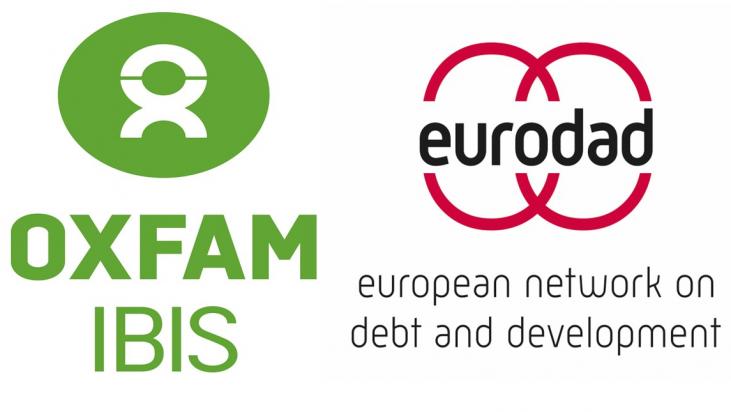International conference on “responsible taxation in development finance”, organised by Eurodad and Oxfam-IBIS.
To register, click here. Please note that registration ends this Wednesday 2 November.
Background
Private actors and finance are at the centre of global and national development initiatives, for both governments and international bodies. Development finance institutions (DFIs) play a central role by providing finance and advice to companies that invest in developing countries. They are institutions with a development mandate and their activities will be key to financing sustainable development. To deliver sustainable development outcomes and to leave no-one behind, it is crucial that the practices of the private sector actors and of the financial institutions supporting them are effective and impactful. They must ensure due diligence and compliance with UN Guiding Principles for business and human rights, but also go beyond this and assist the world in achieving the Sustainable Development Goals (SDGs). NGOs and DFIs share an interest in ensuring their policies and development impacts are the best they can possibly be.
Both the Financing for Development (FfD) outcome document and the SDG agenda emphasised that tax revenues will be critical. However, the Panama Papers have shown once again how tax rules and tax collection are being avoided by the rich and the powerful through an industry of offshore structures with no meaningful economic activity. The International Monetary Fund (IMF) has calculated that profit shifting by multinational enterprises (MNEs) through offshore structures leading to erosion of tax bases should be a big concern for developing countries[1]. This underlines the challenge of not only ensuring legal compliance in tax matters, but also going beyond this, towards responsible tax behaviour of the private sector, which is also recognised in the Addis Tax Initiative and supported by a global movement for tax justice with strong roots in developing countries.
A key question is therefore how the development community – governments, NGOs, DFIs and the private sector – can work together to ensure that investments deliver on sustainable development. They must also ensure that companies, particularly those supported by public resources, pay their fair share of tax. As public institutions with a development mandate, DFIs should be standard setters when it comes to developing and implementing effective safeguards and policies to ensure that the companies they invest in demonstrate responsible tax practices. National governments and politicians around the world also have a key responsibility in ensuring this.
About the conference
This one-day public conference concludes a three-year project on establishing responsible tax standards for DFIs, run by Oxfam IBIS in collaboration with Eurodad, Latindadd and Tax Justice Network Africa[2]. The conference will assess progress made on this agenda and discuss what still needs to be done. It aims to gather 80 participants from the development community, including government officials from North and South, parliamentarians, UN officials, and representatives from multilateral and bilateral DFIs, as well as academics, civil society organisations and private sector actors. To register, click here.
Tentative programme
- Coffee and registration
9.15-9.30 Welcome and introduction By Oxfam IBIS and Eurodad
9.30-10.00 Key note speech followed by Q&A: Pierre Moscovici, European Commissioner for Economic and Financial Affairs, Taxation and Customs
10.00-11.45 Panel 1: Tax in the Agenda 2030 and the Addis Ababa Agenda for Action
Panellists: Alvin Mosioma (Director, Tax Justice Network Africa), Ismaila Diallo (Senior Tax Advisor to the Minister of Finance Senegal), Adam ElHiraika (Director Macro-Economic Policy Division, UNECA), Tove Maria Ryding (Policy and Advocacy Manager, Eurodad)
11.45-12.00 Coffee
12.00-13.00 Panel 2 (part 1): Responsible tax practices in development finance
Presentations by Matti Kohonen (Private Sector Adviser, Christian Aid), Beth McGinley (Senior Compliance Counsel, IFC), Jared Maranga (Policy Lead Tax and Investment, TJN-A)
13.00-14.00 Lunch
14.00-16.00 Panel 2 (part 2): Effective due diligence on tax beyond legal compliance
Panellists: Yvonne Bol (Tax Manager, FMO), Matt Fowler (Senior Integrity Officer, IDB), Sara Jespersen (Project Manager on tax and development, Oxfam-IBIS), Adhemar Mineiro (Economist at DIEESE)
16.00-16.15 Coffee
16.15-17.45 Panel 3: Tax as development impact of DFIs and measuring development
Panellists: Luuk Zonneveld (CEO, BIO), Jan Van de Poel (Head of Policy, 11.11.11), Paddy Carter (Research Fellow, ODI), CDC (tbc)
17.45-18.00 Conclusion, Oxfam IBIS and Eurodad
Followed by drinks reception
Moderator: James Crisp (EurActiv)
[1] IMF, 2015, working paper: base erosion, profit shifting and developing countries https://www.imf.org/external/pubs/ft/wp/2015/wp15118.pdf
[2] More information can be found here: http://thetaxdialogue.org.
